Middle East
Israel plans ‘conquest’ of Gaza in expanded offensive | Israel-Palestine conflict News
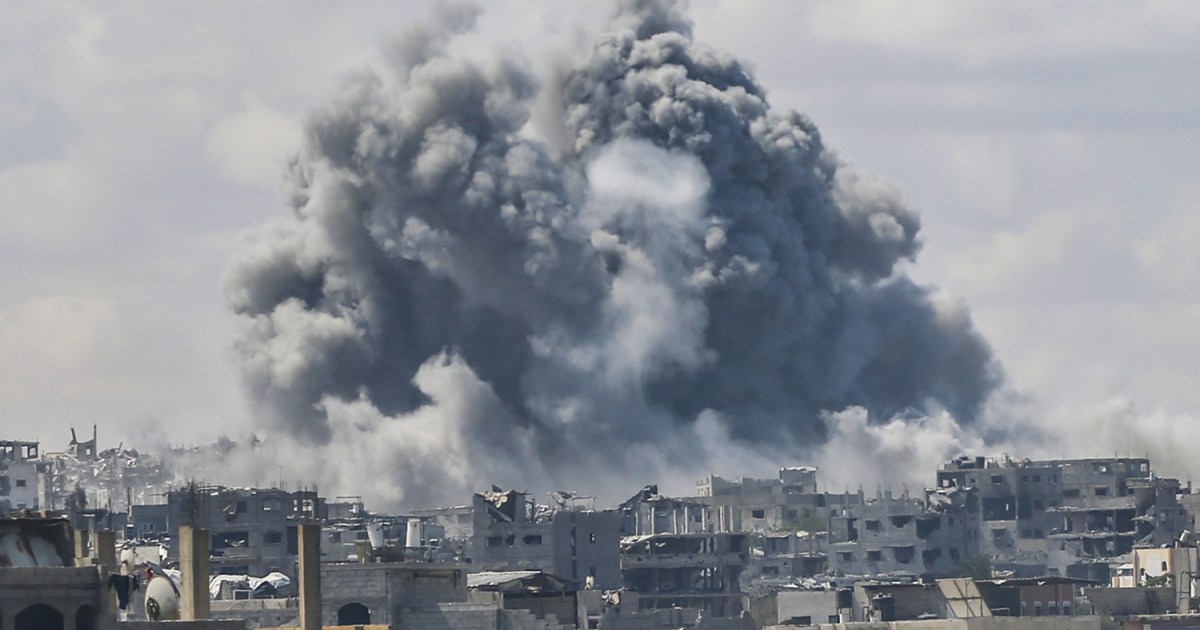
Israel’s political and military leaders have approved plans to expand the Gaza offensive and take over aid deliveries to the devastated and starving enclave, according to reports.
Prime Minister Benjamin Netanyahu’s Security Cabinet unanimously approved plans to call up reservists and put the Israeli military in charge of food and other vital supplies to the 2.3 million people suffering under its blockade of the Palestinian territory.
Newswires reported unnamed Israeli officials suggesting that the plans include the “conquest” and occupation of the entire Gaza Strip.
The expanded offensive “could go as far as seizing the entire enclave”, the Reuters news agency reported.
“The plan will include, among other things, the conquest of the Gaza Strip and the holding of the territories, moving the Gaza population south for their protection,” a source told the AFP news agency.
The source added that Netanyahu “continues to promote” United States President Donald Trump’s plan for the voluntary departure of Palestinians from the enclave.
The plan also includes the possibility of Israel taking over the provision of humanitarian aid in Gaza.
The Israeli government has rejected claims from aid groups that famine is stalking the enclave, despite having blocked the entrance of all supplies on March 2 –16 days before it resumed its war against Hamas.
Citing an unnamed Israeli official, The Times of Israel said the plan would involve “international organisations and private security contractors [handing] out boxes of food” to families in Gaza.
Israeli soldiers would provide “an outer layer of security for the private contractors and international organisations handing out the assistance”, the outlet said.
Heated
Earlier, the Israel Hayom newspaper and The Times of Israel cited sources as saying the plan would include the occupation of Gaza.
The revelations have stirred significant tension inside Israel.
Netanyahu again asserted that the goal was to “defeat” Hamas and bring back several dozen captives held in Gaza.
However, the Hostages and Missing Families Forum, an Israeli campaign group, said in a statement on Monday that the plan is “sacrificing” those still held in the Palestinian territory.
Heated disagreements also reportedly erupted during the cabinet meeting between the political and military echelons.
Army chief Eyal Zamir reportedly warned that Israel could “lose” the captives in Gaza if it pushed ahead with a full-blown military offensive.
Far-right National Security Minister Itamar Ben-Gvir said that, as Israel has done in the past two months, it should continue to block all food, water, medicine, fuel and other aid from entering Gaza to starve the population.
He also advocated for “bombing food warehouses and generators” so there are no more supplies and electricity is fully cut off.
But Zamir warned this would “endanger” Israel as it would expose the country to even more allegations of violations of international law.
“You don’t understand what you are saying. You are endangering us all. There is an international law, we are committed to it. We cannot starve the Strip, your statements are dangerous,” Samir said, according to Israel’s national broadcaster, Kan.
In an interview with Israeli Army Radio, opposition leader Yair Lapid questioned Netanyahu’s decision to mobilise tens of thousands of reservists, saying the prime minister was calling up troops and extending their service without setting a goal for the operation.
Another opposition figure, Yair Golan, said Netanyahu was only trying to save his government from collapsing as the plan “serves no security purpose and does not bring the release of the hostages closer”.
Aid in security zones as ‘military strategy’
Ben-Gvir was reportedly the only member of the Security Cabinet who opposed the plan for Israel to bypass existing aid routes by international organisations.
Israel reportedly plans to use US security contractors to control the flow of aid into Gaza.
However, the plan is not expected to come into effect immediately, as Israeli officials believe there is enough food in Gaza for now, even as Palestinians are starving to death.
The Israeli plans also envisage the establishment of a new “humanitarian zone” in southern Gaza that would work as a base for aid.
The Humanitarian Country Team (HCT), a forum that includes United Nations agencies, said on Sunday that Israeli officials were seeking its consent to deliver aid through what it described as “Israeli hubs under conditions set by the Israeli military, once the government agrees to re-open crossings”.
In a statement, the HCT said such a plan would be dangerous and would “contravene fundamental humanitarian principles and appears designed to reinforce control over life-sustaining items as a pressure tactic – as part of a military strategy”.

The coalition said the UN would not participate in this scheme as it does not adhere to the global humanitarian principles of humanity, impartiality, independence and neutrality.
That position was supported by Hamas, which on Monday branded Israel’s plans to takeover aid provision “political blackmail”.
“We reject the use of aid as a tool of political blackmail and support the UN’s stance against any arrangements that violate humanitarian principles,” the armed group said in a statement, insisting that Israel is “fully responsible” for the “humanitarian catastrophe” in Gaza.
The humanitarian organisations said their teams “remain in Gaza, ready to again scale up the delivery of critical supplies and services: food, water, health, nutrition, protection and more”.
They urged world leaders to use their influence to lift the blockade so that “significant stocks” waiting at the border could be delivered.
In February 2024, more than 100 Palestinians were killed when Israeli soldiers opened fire on desperate Palestinians waiting for trucks delivering food, in what has become known as the “flour massacre“.
The Israeli military acknowledged that it had coordinated the convoy with private contractors, rather than the UN or other humanitarian aid organisations with experience delivering food aid safely.
The US military also tried to build a $230m floating pier in May 2024, as an alternative way to deliver aid to Gaza. But the trouble-prone structure was closed months later, after only bringing in the equivalent of about one day’s worth of pre-war food deliveries.
Five people were killed in March 2024 in one of several efforts to deliver food by air drops. Humanitarian groups have said that airdrops are not able to replace the quantities needed to deliver food to more than 2 million people living in Gaza.
Middle East
Fear and intimidation at Newark airport | Israel-Palestine conflict
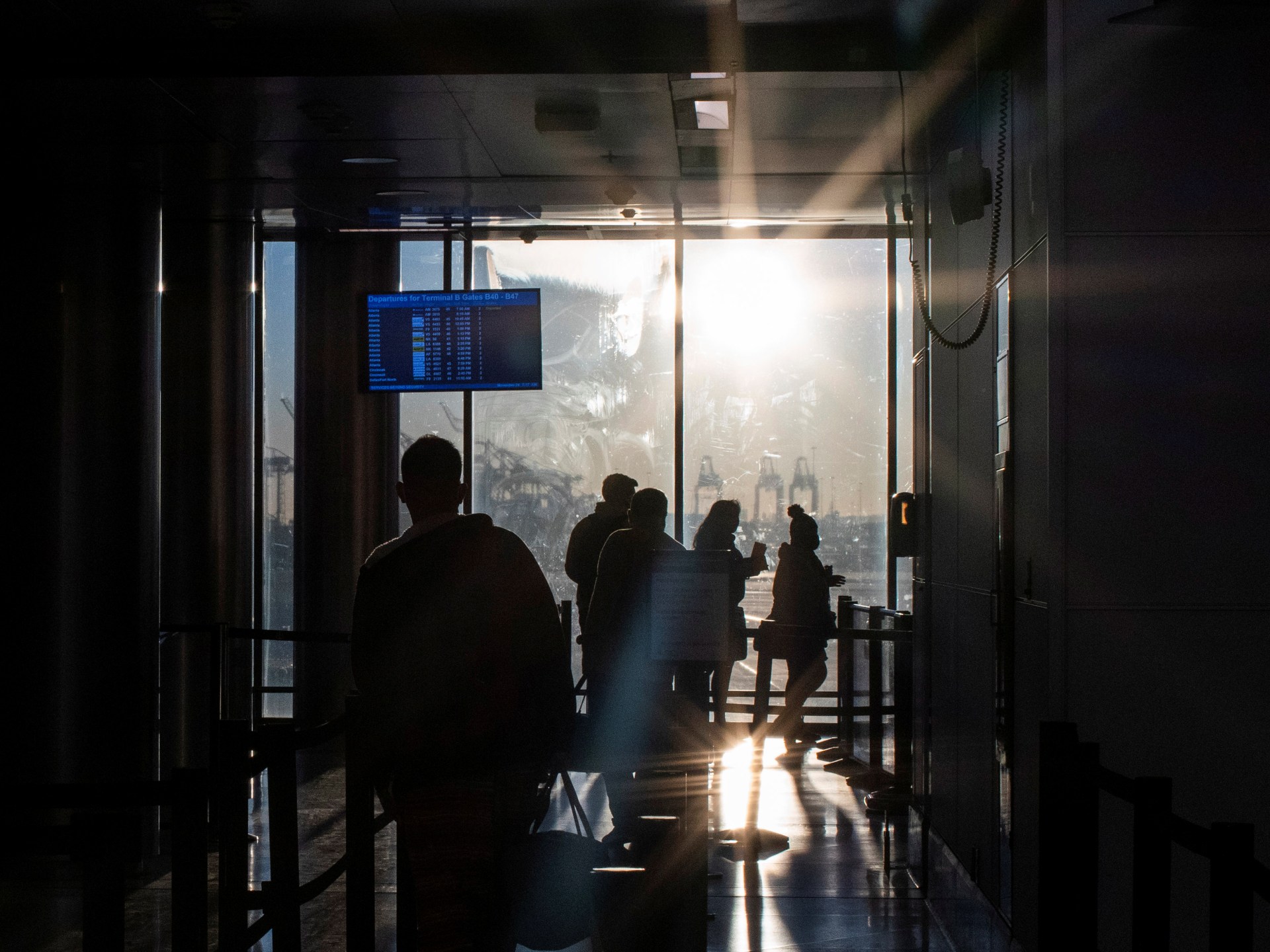
I am no stranger to political repression and censorship. I have lived in Germany for five years now, and as a Palestinian journalist involved in pro-Palestinian advocacy, I have experienced repeated harassment at the hands of the German authorities.
My husband, a German citizen, and I, an American citizen, have grown accustomed to being held for hours at a time, subjected to invasive interrogations about our travels, and having our belongings thoroughly searched without clear justification. But we were shocked to find out that these tactics, designed to intimidate and deter, have now been taken up by the United States to target Palestinians amid the ongoing genocide.
I always knew that citizenship offered only limited protection, especially when dissent is involved. But deep down, I still believed that freedom of speech, the right to speak without fear, meant something in my country of birth.
I was wrong. The harassment we endured on March 24 upon arriving in the US shattered that illusion. Our Palestinian identity, our political work, our family ties – all of it makes us permanent targets, not just in Germany, but now in the US, too.
Prior to departure, while we were at our gate in Frankfurt airport, four agents approached me and identified themselves as officers from the US Department of Homeland Security (DHS). They said they were specifically looking for my husband, who had just stepped aside to buy water and juice for our sons.
“We just want to make sure your ESTA visa is in order,” one of them said.
They took his passport, flipping through it and photographing every single page while one of them stayed on the phone, relaying information. They asked about our visit to Gaza in 2022, after seeing the Rafah border stamp.
“Where did you go in Gaza?” one agent asked.
“Khan Younis,” my husband replied.
“Where does your family live now?”
“All over,” he said. “They’re living in tents across the Strip, you know, because of the war.”
“What did you do while you were there?”
“Visited family,” he answered.
It was clear we were targeted. I did not see any other passengers undergoing a similar check. This meant that either DHS was actively researching passengers before their departure to the US, or – even more troubling – the German authorities were communicating directly with DHS to flag the background and political activity of “suspect” travellers.
Upon arrival at Newark airport in New Jersey, my husband and I were separated and individually interrogated, each of us still holding a sleeping child. The men questioning us did not identify themselves; I believe they were DHS agents, not border police.
They first asked me about the purpose of my trip and my travel to Gaza. They wanted to know who I had met in Gaza, why I had met them, and whether anyone I encountered was affiliated with Hamas. At one point, an officer deliberately became ambiguous and instead of referencing Hamas, asked if “anyone from [my] family was a part of the government in Gaza”.
At one point, they asked whether I experienced violence from Israeli soldiers, to which I responded: “Israeli soldiers weren’t in Gaza in 2022.”
“Did anyone in your family experience violence during this war?”
“Yes,” I responded. “Fifty were killed.”
“Were any of them Hamas supporters?” was the response I received.
As if political affiliation could justify the incineration of a family. As if children, elders, mothers, reduced to numbers, must first be interrogated for their loyalties before their deaths can be acknowledged.
They knew I was a journalist, so they demanded to know the last article I had written and where it was published. I told them that it was a piece for Mondoweiss about the abduction of Mahmoud Khalil, in which I also warned about the dangers of the Trump administration’s policies. This seemed to heighten their scrutiny. They demanded my email address, my social media accounts, and jotted down my phone number without explanation.
Then they took our phones. When I asked what would happen if I refused, they made it clear I had no choice. If I did not comply, my phone would still be taken from me, and if my husband did not comply, he would be deported.
When they finally returned our electronics, they issued a chilling warning to my husband: “You have been here seven times without an issue. Stay away from political activity, and everything will be fine.”
Subsequently, I was advised by legal counsel not to attend any demonstrations, not even by myself, during our stay. Our movements, our words, and even our silences were under watch, and anything could be used against us.
What happened to us was not random; it was intentional. It was meant to scare and intimidate us. Whether it is in Germany, in the US, or elsewhere, the goal of these tactics is the same: to make us feel small, isolated, criminalised, and afraid. They want us to doubt the worth of every word we write, to question every protest we join, to swallow every truth before it reaches our lips. They want us to forget the people we have lost.
Fifty members of our family were murdered in the US-backed genocide in Gaza. Fifty souls, each with their own dreams, laughter, and love, extinguished under the roar of bombs and the silence of the world. Our family’s story is no different from thousands of others – stories that vanish from headlines but live forever in the hearts of the survivors.
They expect us to carry this unbearable weight quietly, to bow our heads and continue living as if our world were not ripped apart. But we do not bow.
And that is why they fear us; they fear a people who refuse to disappear. Palestinians who dare to speak, to organise, to simply bear witness are marked as dangerous.
I was warned that speaking about our experience at the airport would make the next encounter even harsher, even more punishing. But we must remember: there is nothing this state can do to us that can compare to what is being done to the people of Gaza. Our passports are only paper. Our phones are only metal and glass. These are things they can confiscate, things they can break. But they cannot take away our voices, our memories, and our commitment to justice.
On our way out, the officers asked my husband one last question: “What do you think of Hamas? Are they good?”
He responded: “My concern is fighting a genocide that has taken the lives and freedom of my family and my people. Anything else, I am not interested in answering.”
That should be all of our concern. Nothing should distract us from the urgent, undeniable truth: a people are being slaughtered, and our responsibility is to stand with them.
The views expressed in this article are the author’s own and do not necessarily reflect Al Jazeera’s editorial stance.
Middle East
ICJ dismisses Sudan’s genocide case alleging UAE backing of RSF rebels | Sudan war News
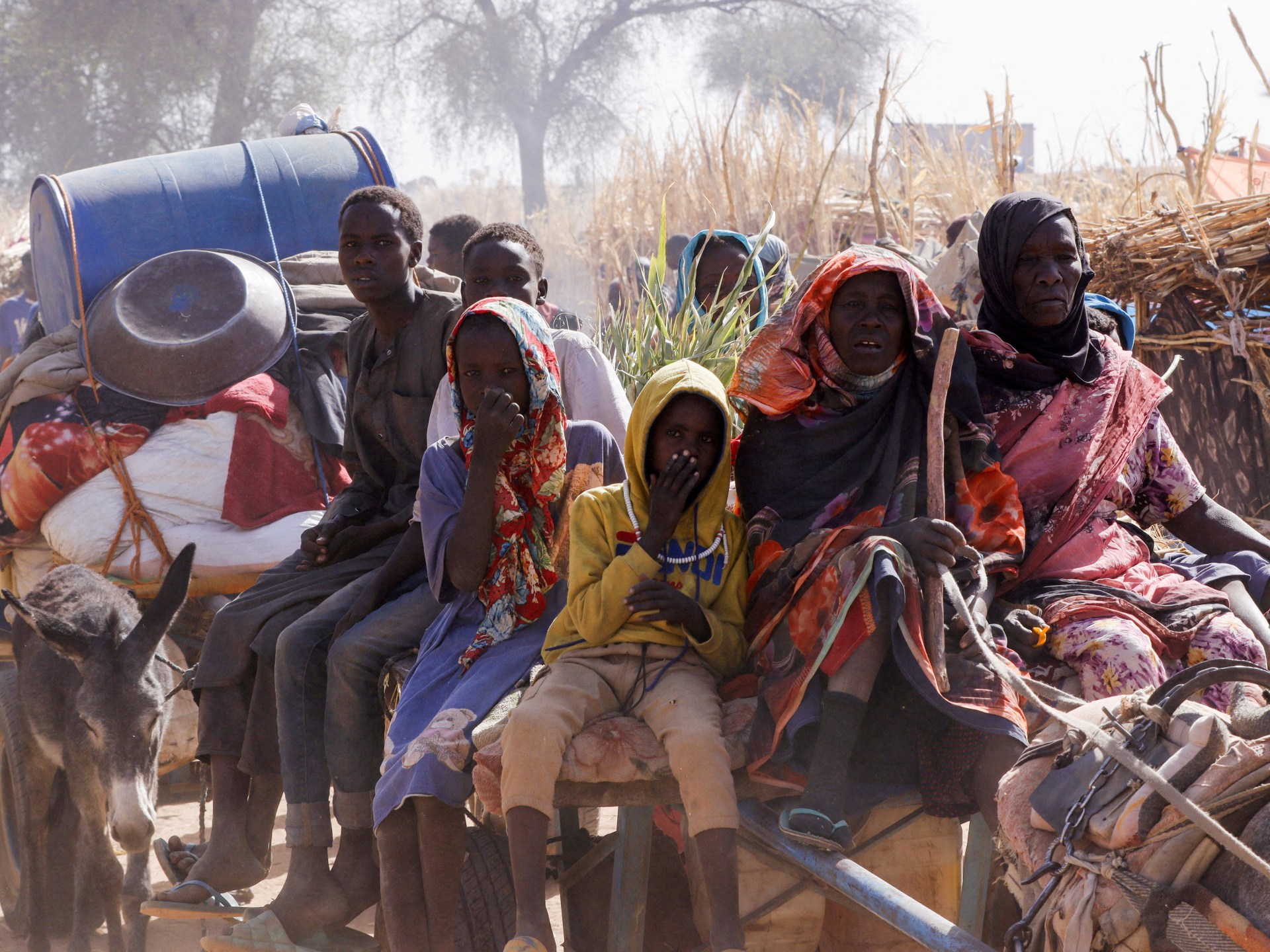
Top UN court says it does not have authority to rule on case accusing UAE of arming rebel Rapid Support Forces paramilitary.
The top United Nations court has dismissed a case brought by Sudan accusing the United Arab Emirates (UAE) of breaching the UN Genocide Convention by arming and funding the rebel paramilitary Rapid Support Forces in Sudan’s deadly civil war.
The International Court of Justice (ICJ) said on Monday that it “manifestly lacked” the authority to continue the proceedings and threw out the case.
While both Sudan and the UAE are signatories to the 1948 Genocide Convention, the UAE has a carveout to the part of the treaty that gives The Hague-based court jurisdiction.
In March, Sudan asked the ICJ for several orders, known as provisional measures, including telling the UAE to do all it can to prevent the killing and other crimes targeting the Masalit people in Darfur.
The UAE called the filing a publicity stunt and, in a hearing last month, argued the court had no jurisdiction.
The court on Monday agreed with the UAE’s arguments, rejected Sudan’s request for emergency measures and ordered the case be removed from its docket.
Due to the lack of jurisdiction, “the court is precluded by its statute from taking any position on the merits of the claims made by Sudan”, a summary of the ruling said.
The UAE hailed it as a legal victory.
“This decision is a clear and decisive affirmation of the fact that this case was utterly baseless. The court’s finding that it is without jurisdiction confirms that this case should never have been brought,” Reem Ketait, deputy assistant minister for political affairs at the UAE’s Ministry of Foreign Affairs, said in a statement.
“The facts speak for themselves: the UAE bears no responsibility for the conflict in Sudan. On the contrary, the atrocities committed by the warring parties are well-documented.”
In an earlier statement, Ketait insisted the UAE “is not involved in the war”.
By a 14-to-two vote, the court threw out Sudan’s request for emergency measures to prevent genocidal acts against the Masalit tribe, which has been the focus of intense ethnic-based attacks by the RSF.
Sudan descended into a deadly conflict in mid-April 2023 when long-simmering tensions between its military and rival paramilitary forces broke out in the capital, Khartoum, and spread to other regions.
Both the Rapid Support Forces and Sudan’s military have been accused of abuses as they battle each other.
The UAE, a federation of seven sheikhdoms on the Arabian Peninsula and an ally of the United States, has been repeatedly accused of arming the RSF, something it has strenuously denied despite evidence to the contrary.
Middle East
How do you keep going in Gaza when everything tells you to stop? | Israel-Palestine conflict
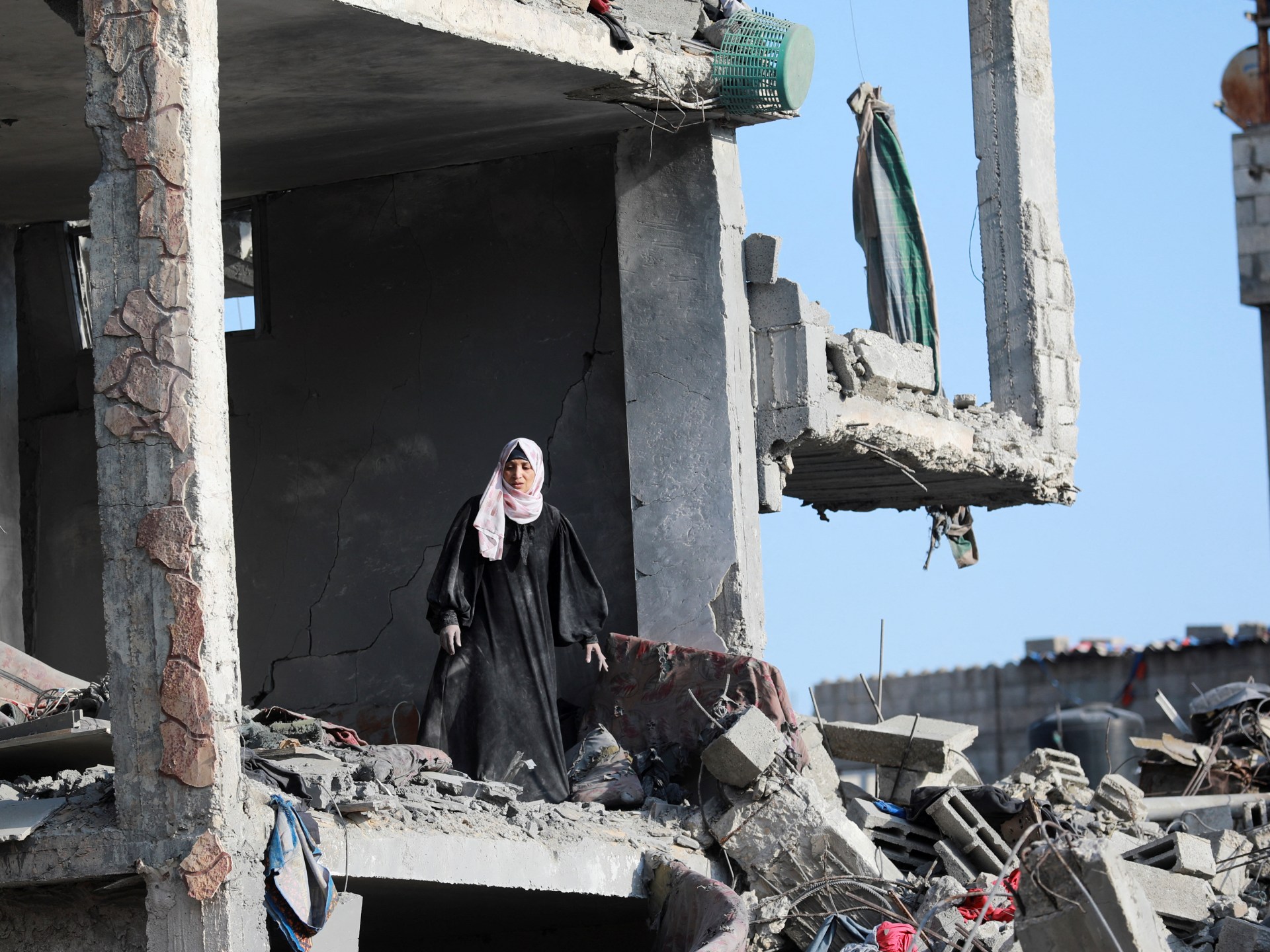
Before the war, my life was simple. Like many young women in Gaza, I carried within me a mixture of ambition and anxiety. My dream was to graduate from the Islamic University with honours and become a writer. My fear was that the constant attacks and instability in Gaza would somehow impede my pursuit of education and a writing career.
However, I never imagined that everything I knew – my home, my university, my friends, my daily routine and my health – could vanish, leaving me struggling to keep going.
When the war began, we thought it was just another short round of fighting – one of the many escalations we had grown used to in Gaza. But something about this time felt different. The explosions were closer, louder, and lasting longer. We soon realised that this nightmare was not going to end; it was only going to get worse.
On December 27, 2023, we received our first “evacuation order”. There was no time to think. We had just begun gathering a few belongings when the sound of bombing grew louder. The upper floors of the building we lived in were being targeted.
We fled the building in a hurry, carrying only a small bag. My father was pushing my grandmother in her wheelchair, while I held my younger brother’s hand and ran into the street, not knowing where we were going.
The neighbourhood looked like a scene from the horrors of the Day of Judgement: people were running, screaming, crying, and carrying what remained of their lives.
Night fell, and we found temporary shelter at a relative’s house. Sixteen of us slept in one room, without privacy or comfort.
In the morning, we made the difficult decision to take refuge in one of the displacement camps declared a “humanitarian zone”. We owned almost nothing. The weather was bitterly cold, water was scarce, and we had only a few blankets. We washed, cleaned, and cooked using primitive methods. We lit fires and prepared food as if we had gone back to the Stone Age.
Amid all of this, we received the news: our home had been bombed.
I refused to believe what I had heard. I sat and cried, unable to comprehend the tragedy. My father’s goldsmith workshop was on the ground floor of the building, so when it was destroyed, we did not just lose walls and a roof – we lost everything.
The days passed slowly and heavily, wrapped in longing and misery. I lost contact with most of my friends, and I no longer heard the voices that used to fill my days with warmth. I would check in on my closest friend, Rama, whenever I had a brief chance to connect to the internet. She lived in northern Gaza.
On January 15, 2024, my friend Rawan sent me a message. It did not reach me immediately. It took days because of the communications blackout.
The words were simple, they shattered me from the inside: “Rama was martyred.”
Rama Waleed Sham’ah, my closest friend at university. I could not believe it. I read the message over and over again, searching for a different ending, a denial. But the truth was silent, harsh, and merciless.
I didn’t get to say goodbye. I didn’t hear her last words, I didn’t hold her hand, or tell her “I love you” one last time. I felt as though I was breathing without a soul.
While I was still processing that grief, I received even more devastating news: on February 16, 2024, my father’s entire extended family – all his cousins, their wives, and their children – were killed. I saw my father break in a way I had never seen before. His grief was so deep that words could not describe it.
Then, death knocked on our door.
On June 8, 2024, we had just moved from our tent to a rented apartment, trying to start our lives over, when the Israeli army surrounded the area. I was the first to see the tank slowly moving up the street. I panicked and ran towards my father, shouting. But I didn’t reach him. In that moment, a missile struck the building we were in. All I saw was thick smoke and dust filling the air.
I didn’t know if I was alive or not. I tried to say the shahada, and by the grace of God, I managed to do so. Then I started screaming, calling for my father. I heard his voice faintly from a distance, telling me not to go out because the drone was still bombing.
I took a few steps, then lost consciousness. All I remember is that they carried me down the building and covered me with a blanket. I was bleeding. I would regain consciousness for a few seconds, then lose it again.
The ambulance could not reach our street because the tank was at the entrance. My mother, my sister, and I bled for two hours until some young men from the area managed to find a way to get us out. They carried me in a blanket to the ambulance. The paramedics started bandaging my wounds right there in the middle of the street, in front of everyone.
All the way, I heard their whispers, saying that I was between life and death. I heard them, but I could not speak.
When I reached the hospital, they told me that I had sustained injuries to my head, hands, legs, and back. The pain was unbearable, and my mother’s absence added to my fear. I was rushed in for an emergency surgery.
I survived.
After leaving the hospital, I had to go back for dressing changes. Each visit was a painful experience. I would choke every time I saw the blood. My father, who accompanied me every time, would try to ease these visits, telling me, “You will be rewarded, my dear, and we will get through all of this.”
I fell into a deep depression, suffering from both physical and emotional pain. I felt as though I was drowning in an endless spiral of sorrow, fear, and exhaustion. I no longer knew how to breathe, how to continue, or even why.
We had no roof to shelter under. Finding food was a struggle. The painful memories of loved ones who had passed haunted me. The fear that my family and I could lose our lives at any moment made me feel utterly helpless. I felt everything was screaming that I could not go on.
Yet, in the darkness of despair, I continued to live, day after day. I was in pain, but I lived.
I went back to reading – whatever books I could find. Then, when my university announced it would resume lectures online, I signed up.
My hand was still broken, wrapped in a cast, and I could barely use it. My mother helped me, holding the pen at times and writing down what I dictated. My professors understood my situation and supported me as much as they could, but the challenges were many. I struggled to access electricity and the internet to charge my phone and download lectures. Sometimes, I would lose exams due to power outages or poor network, and I would have to postpone them.
Still, I kept going. My physical condition gradually started to improve.
Today, we are still living in a tent. We struggle to secure the most basic needs, such as clean water and food. We are experiencing famine, just like everyone else in Gaza.
When I look at the scars of war etched into my body and memory, I realise that I am no longer the same person. I have found within myself a strength I never knew existed.
I have found a path through the rubble, meaning in the pain, and a reason to write, to witness, and to resist despite the loss. I have made the decision to stay alive, to love, to dream, to speak.
Because, quite simply, I deserve to live, just like every human being on earth.
The views expressed in this article are the author’s own and do not necessarily reflect Al Jazeera’s editorial stance.
-
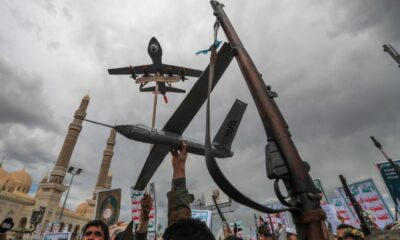
 Conflict Zones2 days ago
Conflict Zones2 days agoHouthis maintain pressure on Israel as US launches more strikes on Yemen | Politics News
-

 Europe2 days ago
Europe2 days agoTrump draws criticism with AI image of himself as the pope ahead of the papal conclave
-

 Middle East2 days ago
Middle East2 days agoCanelo Alvarez beats Scull to reclaim undisputed super-middleweight title | Boxing News
-
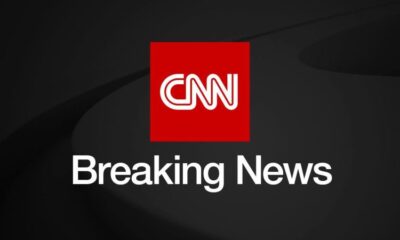
 Europe2 days ago
Europe2 days agoFour Iranians among five arrested in UK over alleged terror plot
-
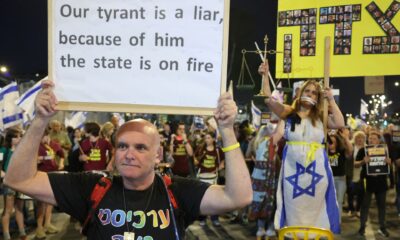
 Middle East2 days ago
Middle East2 days agoIsraelis protest for captives, against Netanyahu’s Gaza war expansion | Israel-Palestine conflict News
-

 Lifestyle2 days ago
Lifestyle2 days agoRain Barrel Village gives visitors a taste of old Florida and a photo op with a giant lobster
-

 Europe1 day ago
Europe1 day agoFather of crypto entrepreneur rescued from kidnappers after having finger severed
-
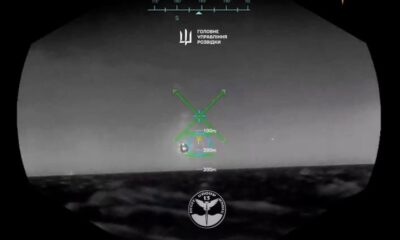
 Europe2 days ago
Europe2 days agoUkraine claims it destroyed Russian fighter jet using seaborne drone for the first time




